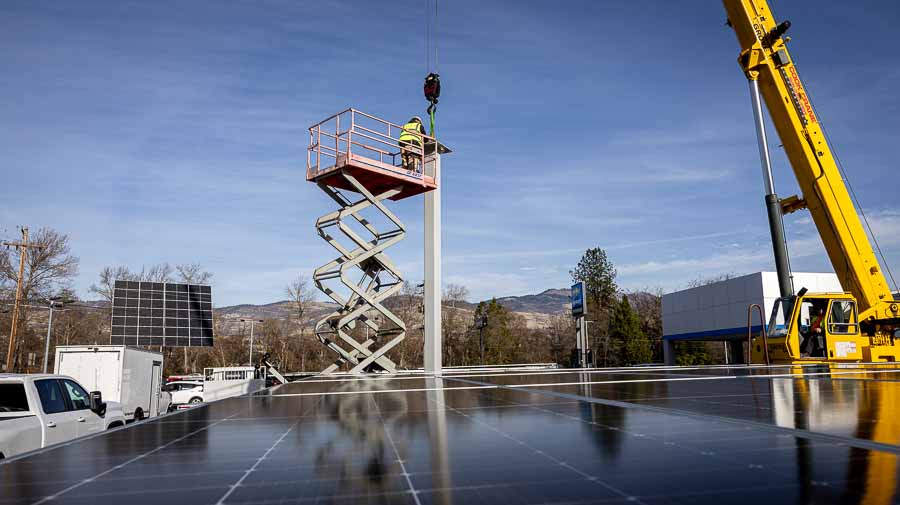Raised panels follow the sun throughout the day to generate electricity
By Jim Flint for Ashland.news
Ashland's TC Chevy has taken a major step in sustainability and has become a shining example of clean energy innovation with the addition of three new Stracker solar systems to its existing five units.
The dealership is now able to operate entirely on solar energy, achieving net zero status and proving that the path to a greener future starts at home.
The original five elevated solar arrays, manufactured by Ashland-based Stracker Solar, were installed in late summer 2022. When dealership owner and operator Derek DeBoer decided to go solar, he chose Stracker because of its state-of-the-art technology.
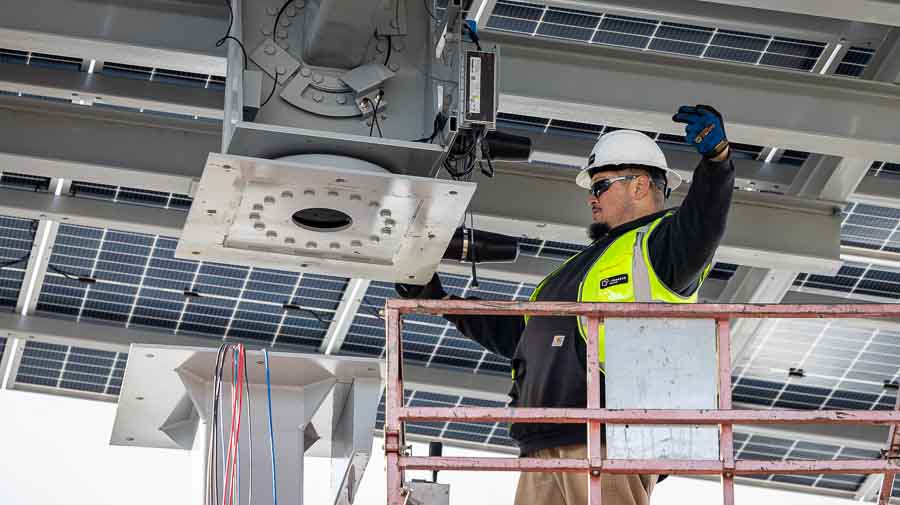

“Our cars and trucks feature the latest designs and manufacturing processes, and we wanted a solar power system that did the same,” he said at the time.
Although installation costs are very site and project specific, a solar six-pack can cost between $240,000 and $390,000, said Jeff Sharpe, founder and CEO of Stracker.
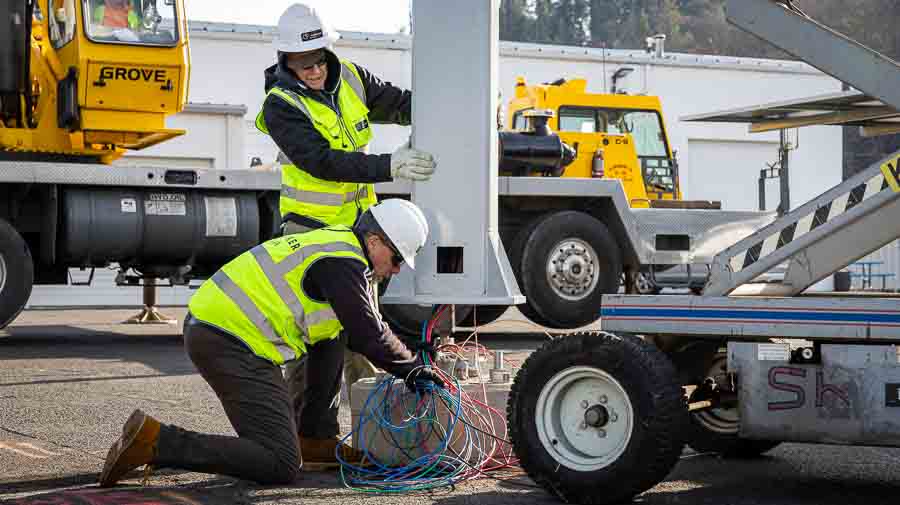

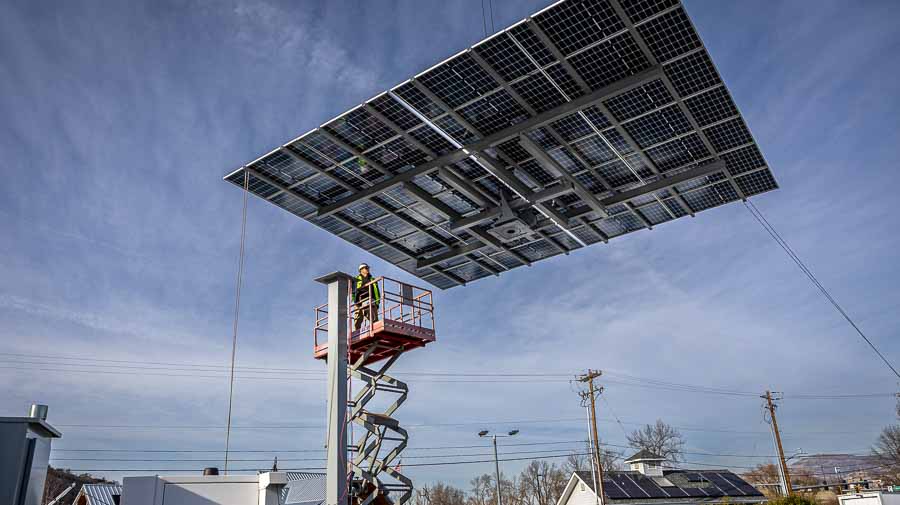

“I guess it was more than just 'dipping a toe in the water,'” DeBoer said this week of the move two years ago. “But we were fascinated by the product and for me there is no better way to understand something than to experience it first hand.”
Each stracker array features multiple solar panels on a 20-foot-tall pole. The dual-axis arrays track the sun throughout the day. This means they generate up to 70% more solar energy than fixed systems of the same size.
The payback
It doesn't take long for the initial investment costs to pay off.
“Easy paybacks after only federal tax credits and incentives apply for five to seven years in Oregon’s low-cost utility districts,” Sharpe said. “Utility, REAP (Rural Energy for America Program) or ODOE (Oregon Department of Energy) incentives can significantly shorten these time frames.”
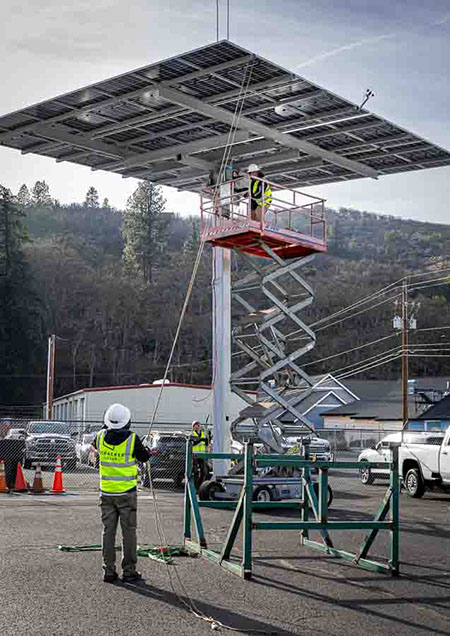

He said the company expects a simple payback in less than two years at locations in California where electricity prices are much higher.
Better than expected
DeBoer said the Strackers' performance exceeded expectations. “The original installation covered about 60% of our electricity needs.”
DeBoer had high praise for Sharpe.
“Jeff is a great man,” he said. “His vision and this product are very impressive. It's a bonus that he's on site. We’re always happy to do whatever we can to support local businesses and we ask others to do the same.”
The three new solar systems are larger than the first five installed at TC Chevy. The combination of eight arrays will cover 100% of the retailer's power needs.
“I imagine we will ultimately look at other properties that could benefit from the addition of units,” DeBoer said.
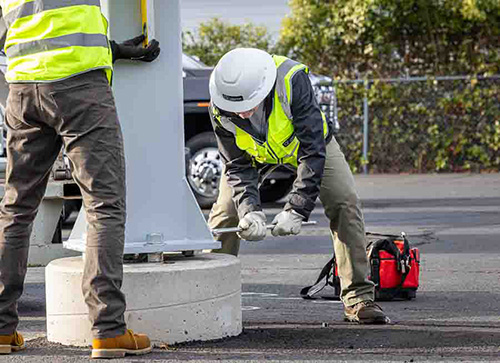

The increasing number of electric vehicles and increasing demand on the grid will require more power and new efficiencies.
“We’re trying to do our part,” he said.
Driving the solar business forward
Stracker Solar has been in business for eight years. To date, 70 elevated solar arrays have been installed, primarily in southern Oregon and northern California.
“But we are currently developing and awarding projects elsewhere in California, as well as in Kentucky, Minnesota, Switzerland and beyond,” Sharpe said.
Keep up with technology
Stracker has 10 full- and part-time team members and another 10 to 15 subcontractors. Recent installations include six solar arrays for Work Sharp Tools in Ashland, six at Our Table Cooperative Farm in Sherwood, Oregon, six for the City of Ashland and eight for EPF Solar in Minneapolis.
Sharpe's involvement in solar came early in his career. He started in solar with his father in 1976, designing, building and installing “breadbox” water heaters that used solar energy to heat volumes of water before flowing into a traditional water heater.
He then became a professional engineer and licensed contractor. After doing business in Steamboat Springs, Colorado, and Corvallis, Montana, he moved to Ashland 18 years ago where he founded the engineering firm Sharpe Energy Solutions Inc.
“A light came on”
The idea for an elevated solar system came to Sharpe while he was working on a five-tracker installation for an elementary school in California.
“A light came on,” Sharpe said. “I realized the value of locating the mechanical and electrical systems well out of reach to avoid fences and preserve the school grounds underneath.”
DeBoer learned about Sharpe and Stracker Solar through his father, Alan DeBoer.
“My father met Jeff and was impressed by his drive and ingenuity,” DeBoer said.
Saving money was not TC Chevy's primary motivation for moving forward with the project.
When Derek DeBoer greenlit the project two years ago, sustainability was his primary concern.
“It’s a responsible way to offset electricity consumption,” he said at the time, “and I’m sure it will eventually pay off financially.”
There is little doubt in his mind that his belief was justified.
Freelance writer Jim Flint is a retired newspaper publisher and editor. Send him an email at [email protected].
